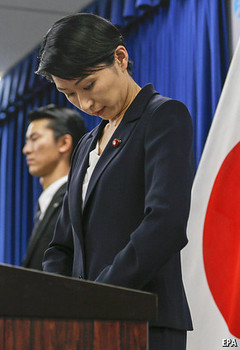スキャンダラスな日本の政治家たちーその① [政治]
Japanese politics
Sukyandaru
Shinzo Abe’s plan to raise the profile of women in his cabinet is in tatters
(Economist 2014/10/25)

イギリスの経済誌エコノミストが見た日本のスキャンダラスな政治家たちーその①
★独走態勢かと思われた安倍政権ですが、ここにきて思わぬつまずきを見せています。
次から次へと出てくる閣僚たちのスキャンダルに安倍首相は振り回されているようです。
イギリスの経済誌エコノミスト10月25日号は「日本の政治」と題する記事で、最近の与党自民党の閣僚たちから出てくるスキャンダルについて取り上げています。
海外のメディアが日本の政治をどのように見ているのか参考になると思い、拙訳ですが記事を訳してみました。
英文記事は文末に載せてあります。
日本の政治スキャンダル
安倍晋三内閣の女性閣僚の活用策が裏目にでる
エコノミスト10月25日号
Ⅰ
「閣僚を一人失うことは残念なことだと思われるが、同じ日に2人も失えば、安倍首相は不注意だと見られてしまう。(内閣改造で)最近経済産業相に任命されたばかりの小渕優子氏と松島みどり法務大臣が政治資金規正法というささいな違反に問われて10月20日に辞任した。女性の活躍を推進する政策を掲げていた安倍首相にとっては大きな痛手となった。野党の民主党はこの機会に乗じて政府自民党への攻勢を強めており、他の閣僚たちは自分たちのスキャンダルのもみ消しに躍起になっているところだ。2012年に政権の座に復帰した安倍政権にとっては最初の大きなつまずきに直面した形となってしまった。」
Ⅱ
「これまで閣僚たちのマネー・スキャンダルが発覚しなかったのは驚くべきことには違いない。お金にまつわる犯罪はこれまで日本の政治の世界では日常茶飯事となっている。政治家が金の延べ棒や多額の現金を賄賂目的で自宅に隠して逮捕されたのはつい数十年前のことである。ごく最近では、2009年12月に民主党政権で最初に首相になった鳩山由紀夫が政治献金リストに死亡した人の名前や違う人の名前を記載したことが判明した。実際は鳩山氏のそうした政治献金のほとんどが企業遺産を受け継いだ彼の母親から来ていたものである。」
Ⅲ
「小渕優子、松島みどり両氏が犯した違反はごく小さなものである。松島氏の過失は支持者に1枚約80円のうちわを数千枚配布したというもの。このことが公職選挙法違反となった。今ではこのうちわにはプレミアムがつき、ネット上では1枚10、000円もの値段で売買されている。」
Ⅳ
「小渕優子後援会事務所は地元選挙区の支持者らの東京での観劇会参加費の一部を負担した。日本では選挙活動費の使い道については法律で厳しく規定されているが、同時にあいまいなところもある。将来の首相候補の1人と目されていた小渕優子氏の場合は不注意だった。2002年、当時の小渕恵三首相は心筋梗塞で倒れ、数週間後に亡くなった。当選が確実な国会議員の中でいわゆる世襲議員は地元後援会事務所が適切に機能しているかどうかについてはあまりチェックはしない。」
その②に続く
TO LOSE one minister may be counted a misfortune. To lose two on the same day makes the prime minister look careless. On October 20th Japan’s recently appointed trade and industry minister, Yuko Obuchi, and justice minister, Midori Matsushima, resigned from the cabinet following small infringements of political-funding rules. It is a blow to Shinzo Abe’s efforts to boost the standing of women in Japan. The opposition Democratic Party of Japan (DPJ) is making hay, and other government ministers have had to deny wrongdoing. It adds up to the first biggish wobble for Mr Abe’s government since he returned to office in December 2012.
Perhaps the administration’s absence of money scandals until now is the surprising thing. Financial wrongdoing used to be a regular fixture of Japan’s political scene. It was only a couple of decades ago when politicians might be caught hiding gold bars and bundles of cash from bribes at home. More recently, in December 2009, when Yukio Hatoyama was the DPJ’s first prime minister, he was found to have included dead and false contributors on his list of campaign donors. Most of his money had actually come from his mum, heir to an industrial fortune.
The infractions committed by Ms Obuchi and by Ms Matsushima are trivial. The latter’s misstep was to hand out to her supporters thousands of paper fans with her image printed on them; they were worth roughly ¥80 (75 cents) each. That broke the law on giving valuable items to followers. Now, as political mementoes, they change hands online at around ¥10,000 apiece.
Ms Obuchi’s office helped pay for supporters from her constituency to make theatre trips to Tokyo. Japan’s rules on the permitted use of campaign money are at once strict and vague, but Ms Obuchi, who has often been mentioned as a future prime minister, was careless. She took over her parliamentary seat, at the age of 26, from her father, Keizo Obuchi, who suffered a stroke in 2000 while he was prime minister and died some weeks later. Political types say that so-called “hereditary” members in safe Diet seats—and there are many—often fail to ensure that their constituency headquarters are run properly.




コメント 0